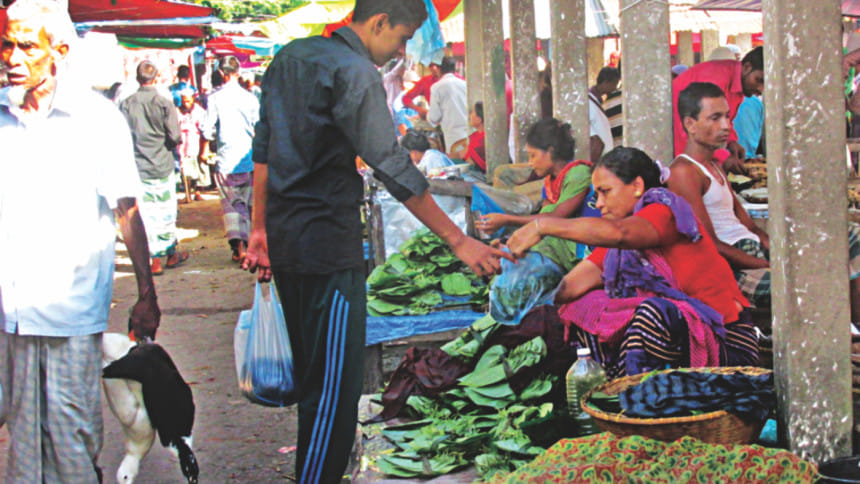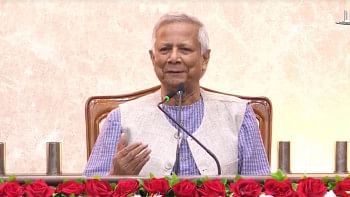Betel leaf business makes Khasi women self-reliant

Housewife Mira Yangyung, 45, from Jaintapur Khasi Para village in Sylhet's Jaintapur upazila used to be bound to money brokers, snared in a debt cycle. In her area it's a common scenario. But like an increasing number of other Khasi women, Mira took her future back. She became a businesswoman.
"The initial loan was to help meet family expenses," Mira says. "My husband was the sole income-earner and his earnings were insufficient." With the broker's loan stipulating that by way of repayment the family's betel leaf could only be sold to the broker, at a rate well below market prices, it proved a loan trap. Mira's life became one of crises and insults.
Like many Khasi women in her position, the future looked bleak. Mira saw only one way out: to realise the grand dream of financial independence.
Starting with another small loan from an NGO, Mira established her own betel leaf business. Finally she could take advantage of the higher bazar prices for her family's produce. But working in the market wasn't easy. Khasi women traders were a small minority there, in a world of Bengali men.
"It was hard to build good relationships with the Muslim betel leaf traders in the Jaintapur bus stand market at first," she says, "but I was determined. I just kept trying." She says that the money brokers initially tried to disrupt her business, while some would-be customers laughed to see a woman at work; they bought their betel leaf elsewhere.
Times have changed. That was five years ago and gradually Mira and several other Khasi women have become regular faces in the bazar. These days she earns Tk 20,000 per month, an income that contributes much to her family.
Archona Ryumbai, 50, from the same village, shares a similar history. "Only after I took a loan from the money brokers did I understand they would give only a minimal price for our betel leaf." She then cut connection with the brokers; but to take a more beneficial path wasn't straightforward. "I lacked capital. Fortunately, I found some of my relatives were willing to give me a loan."
Within six months Archona had paid her debts and now she also sells betel leaf in the bazar. "I find the other Muslim traders are helpful," she says. "They give useful suggestions about how to run my business."
Neighbour Biva Suchiang, 48, took assistance from a bank to start her betel leaf trading business. "At first I faced problems because the banks are reluctant to provide finance to poor women, especially to an uneducated woman like me. They imposed difficult conditions like producing title documents to prove home and property ownership. But I got used to their systems."
According to assistant professor of plant pathology and seed science at the Sylhet agricultural university, Monirul Islam, betel leaf farming is more profitable than many other crops, if it's grown properly. As a traditional crop, it's an activity in which many Khasis have more than a little experience.
"Locals prefer my betel leaf," says another Khasi woman trader, Koruna Suchen, 50, who is busy washing leaves in the bazar as she speaks. "My betel leaf is fresh. Per bundle of 144 small betel leaves, what we call a kanta, the price is Tk. 30; for large size, Tk. 40. On average I earn from Tk 200 to Tk 300 per day."
Chondra Nongtuh, 51, also from Jaintapur Khasi Para, says many locals visit her home to buy the betel leaf direct. The rest of the crop she sells along with the other ladies at Jaintapur bus stand bazar. "Selling betel leaf makes us self-reliant," she says.
Monjur Hosain, a betel leaf trader from Jaintapur bus stand bazar told The Daily Star that along with his colleagues, he is happy when the Khasi women trade beside them. "Their system of business is very clean," he says. "They are helpful and for that, we like to cooperate with them."
"Some banks and NGOs have come around to the idea of Khasi women entrepreneurs," says Jaintapur upazila's chairman, Joynal Abedin. "Arranging microcredit is now easier. It's a crucial development that has helped many Khasi women to become financially independent. I hope their efforts can inspire yet more."

 For all latest news, follow The Daily Star's Google News channel.
For all latest news, follow The Daily Star's Google News channel. 



Comments